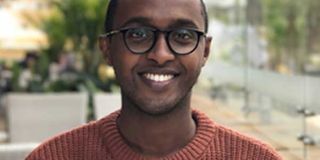TAKE 5:Abdi Latif Dahir

Abdi is a 28 year old journalist and the founder of Sahan Journal. PHOTO | COURTESY
What you need to know:
- The creative and literary talent in our country doesn’t reflect in our day-to-day journalism. We don’t invest in storytelling, in narrative reporting or in-depth analyses of issues and people. Most of the time, what we produce is based on the “he said”, “she said” method of reporting.
- I will put it bluntly, it’s tough being a Somali in Kenya. Being viewed as “the other” in society, being viewed with suspicion everywhere you go, is an arduous task. For instance, I cannot go anywhere, to the shops or the mosque, without carrying my ID card.
- The pen is the best tool for change that I have. I have a job where I get to travel, talk to people, and write about their experiences in the hope that there would be a policy shift in various areas.
Abdi is a 28 year old journalist with works published in The Guardian,United Press International, Daily Nation, Business Daily, The East African, and The Africa Report.
He has a Masters of Arts in Politics and Global Affairs from Columbia Journalism School and a Bachelor’s degree in Journalism with a minor in International Relations from the United States International University-Africa.
1. Why did you and your friends start the Sahan Journal?
The word ‘Sahan’ means ‘quest’ in Somali, and describes the long search for something. Sahan Journal is an undertaking that started from the need to create an indispensable source of information on Somalis and Somalia. It also started from the need to do compelling journalism that inspires discussion and engages readers in intelligent debate. In that spirit, my three friends and I wanted to create a platform that would bring the stories of Somalia and Somalis to the world and the world to wherever Somalis live.
2.What is the difference between Kenyan journalism and international journalism?
The creative and literary talent in our country doesn’t reflect in our day-to-day journalism. We don’t invest in storytelling, in narrative reporting or in-depth analyses of issues and people. Most of the time, what we produce is based on the “he said”, “she said” method of reporting—which is essential, but can be plodding and unimaginative when done over and over again.
3.What do you think it will take for Kenya to step up and become a country that cares about its people?
We talk about Kenya as if it is an abstract concept, as an imagined community somewhere that needs fixing. What we forget is that Kenya is you and I, is our parents and siblings and friends, and that the process of change begins with all of us here and now. Every act we do in our daily lives, every mistake we correct, every injustice we resist, every good story we write is a potential step towards the ideal country we all want. As a favourite journalism instructor of mine constantly repeats, “Everything matters, and it matters all the time.”
4.Tell us a little bit about your experience of being a Somali in Kenya
I will put it bluntly, it’s tough being a Somali in Kenya. Being viewed as “the other” in society, being viewed with suspicion everywhere you go, is an arduous task. For instance, I cannot go anywhere, to the shops or the mosque, without carrying my ID card. I carry it when I go jogging. I was once stopped by police while jogging in Kileleshwa, but I had my ID, otherwise I would have been arrested. My passport is full now, and I am dreading the process, and scrutiny, of applying for one.
5.What are you doing to foster change in your sphere of influence for the ideal better tomorrow?
The pen is the best tool for change that I have. I have a job where I get to travel, talk to people, and write about their experiences in the hope that there would be a policy shift in various areas. I also give talks wherever I can, including in universities, where the next generation of leaders are being molded.
I believe the best thing we can do as Kenyans is to get organised, educate ourselves about our past and differences, and build collaborations.
******
HAPPENING SPOT
Jalada Mobile Literary and Arts Festival
For the first time, literary collective, Jalada Africa, is putting on a mobile literary arts festival that will involve travelling across five countries in 12 different locations. If you won’t come to the festival, it will come to you!
It will take place from March 3 to the 31, with the Nairobi leg starting this weekend at Kenya National Theatre and the Goethe-Institut. It will then proceed to Nakuru, Kisumu, Kampala, Kabale, Goma, Kigali, Mwanza, Arusha, Dar es Salaam, Zanzibar and finally, Mombasa.
Attend masterful master classes, mchongwano competitions, bookish ‘bookversations’, literary discussions, and feel that connection all over East Africa. For more details check out their website: www.jalada.org/festival
*****
Blog of the week
The CoverUp
https://www.youtube.com/channel/UCmDguhmwrMaXT_9mYXM_7Ww
You know Sikin from the competition, Tecno Own The Stage held early 2016. Sikin has been a regular performer on Nairobi’s art scene, and not winning that competition did not cower her into a hole that would have killed her career. On the contrary, she kept performing, kept singing and growing, and is now doing some pretty sweet vocal arrangements on her YouTube channel, Sikin Music. If you’re interested in people who can sing and slay covers, check out the three videos she has online already. They keep getting better.





